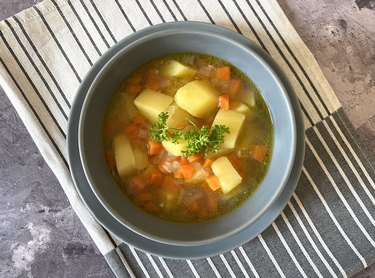
If you're burning up with a fever, you no doubt want relief fast. While no one food can cure a fever, soup's hydrating and anti-inflammatory effects make it one of the best foods for fevers. Though soup won't cure your fever, it can help provide some relief when you're sick.
Related Reading
Video of the Day
Soup for Sickness
A fever is a weapon your immune system deploys to fight off a common cold and other viral or bacterial infections — which means fever is a symptom of an illness, per the Cleveland Clinic. So for food to get a fever under control, it clearly needs to tackle the underlying issue.
Video of the Day
Can soup do that? It has many properties that help fight illness, like being good for hydration and having anti-inflammatory effects.
"We all love to eat soup when we are sick," says Ontario, Canada-based Russell de Souza, ScD, RD, registered dietitian, nutritional epidemiologist and associate professor at McMaster University. But the anti-fever power of soup, he says, is likely less about its specific nutritional makeup and more about its significant role in promoting hydration.
"The main benefit of soup when we are sick with a fever is that it encourages us to keep drinking," he says. "When we have a fever, we often sweat, so our bodies lose fluids. Staying hydrated keeps us replenishing those fluids" — and soup, he says, gets the job done.
The importance of hydration is also central to battling influenza, according to the Centers for Disease Control and Prevention (CDC).
While not everyone who gets the flu develops a fever, it's one of the telltale symptoms, and fever raises dehydration risk, per the CDC.
As far as staying hydrated goes, the CDC recommends drinking clear liquids, such as soup broth or water.
Chicken Soup for Colds
Fever is also a standard feature of the common cold, per the Mayo Clinic.
Cue the chicken soup: It's been a go-to remedy for colds since at least the 12th century, per the U.S. National Library of Medicine (NLM). They say it won't cure you completely, but the steam flowing through your nasal cavities and the extra fluids, which help thin mucus, could provide some relief.
Again, de Souza says, like all soup, when tackling a cold, chicken soup's fever-fighting talent is primarily hydration.
"Chicken soup may also have a mild anti-inflammatory effect that can help ease cold symptoms," de Souza adds.
Chicken, broth and vegetables likely contribute to that effect, per the Mayo Clinic. It's not a fever reducer though, per the NLM. (And don't forget, there is no cure for the common cold but time, according to the Mayo Clinic.)
Related Reading
Vegetable Soup and Fever
Vegetable soup may also help ease a fever.
Many ingredients in classic vegetable soups have anti-viral and immune-supporting properties, according to the Cleveland Clinic, such as carrots, peas, beans, mushrooms and leafy greens. All told, these vegetable soup staples may support an overall healthy immune system, which in turns helps you ward off fever-causing flus and colds from taking hold in the first place.
- Russell de Souza, ScD, RD, registered dietitian, nutritional epidemiologist; associate professor, Department of Health Research Methods, Evidence, and Impact, McMaster University, Hamilton, Ontario, Canada
- Centers for Disease Control and Prevention: “The Flu: Caring for Someone Sick at Home”
- U.S. National Library of Medicine: “Chicken Soup and Sickness”
- U.S. National Library of Medicine: “Chicken Soup and Sickness: Images”
- Mayo Clinic: “Common Cold: Diagnosis & Treatment”
- Cleveland Clinic: “What to Eat When You're Sick”
- Cleveland Clinic: “Eat This, Not That to Fight Colds and Flu”
Is this an emergency? If you are experiencing serious medical symptoms, please see the National Library of Medicine’s list of signs you need emergency medical attention or call 911.